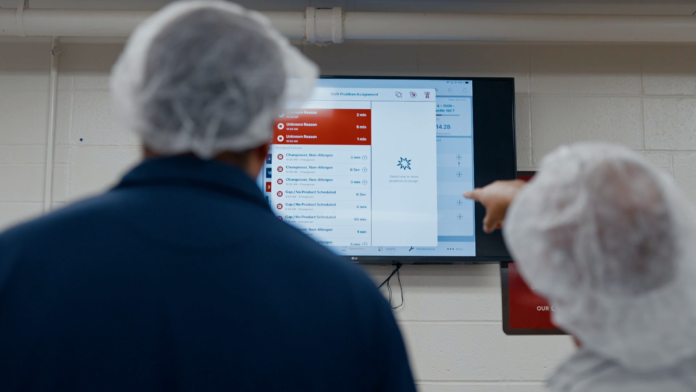
Article sponsored by Redzone
The manufacturing industry is facing three major challenges concurrently: inflation, supply chain shortages, and a persistent labor crunch. Amidst these concerning macro trends, we’re also facing a more human challenge driven by this changing employer-employee power dynamic. Employees are understandably wondering what they’re working for and asking questions about where and how work should happen. Though many are retiring early in the hard-hit food industry, others are seeking new roles, jumping from companies that offer bonuses to those that provide the nebulous benefit: purpose.
Retirement and turnover aren’t new challenges. After all, manufacturing is a vanguard of 20th-century America. Workers once viewed this industry as their path to success, but today’s younger generations show less interest. With baby boomers retiring to the tune of 10,000 per day, as many as 2.1 million manufacturing jobs could go unfilled by 2030. Given these obstacles, manufacturers need to realize the positive connection between a purpose-driven work life, their employees’ well-being, and their bottom line.
Defining work with purpose
Purpose, a “self-organizing life aim that stimulates goals,” cannot be distributed in the workplace. Instead, it’s an intangible, highly personal motivator that excites us and keeps us working toward our goals. To stay competitive, companies must find ways for employees to feel connected to a greater purpose – from the corporate mission right to the work being done on the shop floor.
Leaders often try to rally employees around their organization’s mission statement and key performance indicators (KPIs). However, trying to motivate employees around company KPIs is unlikely to move the needle – unless purpose is put into the hands of every worker.
What does that look like?
Frontline workers want to take ownership of goals and issues in their work environment and be provided with the information and support needed to make a difference. “Everyone wants to be mentally engaged and have a say in how they do their jobs, but when you’re busy at the line, it’s nearly impossible to get the information and training you need to make good decisions,” said Alex Allen, VP of Operations at Pearson’s Candy Company, a chocolate and confectionery manufacturer in Saint Paul, MN. “Redzone literally puts critical information into the hands of our frontline employees and gives them clear and simple communication channels to connect with the appropriate teams like maintenance and quality for support. Instead of waiting for supervisors to run to the office to check emails, quality and maintenance manuals, and accounting systems, our employees are getting this information immediately and can take quick action. This then frees up the supervisors to work on Kaizen and proactive improvement projects. Instead of employees feeling frustrated as they wait for supervisors to call maintenance, now they see supervisors delivering continuous improvements that make their jobs easier.”
In other words, employees who solve problems and win together make a difference at work and in their community. They begin to feel what it is to work with purpose.
Who wants to work with purpose?
With baby boomers retiring at large rates, who will replace them? Millennials are next in line to fill their shoes, and employers need to be preparing accordingly. 80% of millennials consider life-work balance when deciding whether to accept a job offer.
But millennials, rather than not wanting to work at all, may simply want more meaningful roles in a purpose-driven workplace. After all, 94% say they desire work where they can make a difference. Evolving the workplace to appeal to the current labor market benefits employers: millennials are the largest generation in the labor force, with 56 million workers. In contrast, baby boomers contribute 41 million employees to the workforce. When millennials demand to work with purpose, can food plants afford not to offer this benefit?
The benefits of working with purpose
Creating a purpose-driven workplace can give food manufacturers a leg up on their competition.
Productivity increases
Purpose keeps us motivated and inspired to fulfill our aspirations, and inspired workers are three times more productive than unengaged workers. Ultimately, working with purpose lets plants realize more profit with fewer employees while prioritizing employee wellbeing. Is it possible to triple the workforce without hiring a single employee? Only if plants can harness the power of a fulfilled employee.
Engagement improves
Purpose drives employees to meet goals as a community. Collaboration and communication improve, and employees can see the triumphs and setbacks of their colleagues, developing ways to intervene and help everyone meet their goals together. Sometimes, working with purpose means employees elevate their coworkers by educating them about line issues they’ve previously fixed. Other times, they help newcomers successfully integrate into the group. There are many ways to work with purpose, so embrace ways that allow employees to collaborate more and find their own.
Employee turnover decreases
Knowing you contribute meaningfully to the plant increases retention. “I believe we all want to come to work knowing we are making a difference,” said Suman Shekar, operations manager at Companion Baking Co., a small batch bread manufacturer in St. Louis, MO. “Redzone has helped me keep people on the line who have developed internal knowledge and who are really integral to the entire manufacturing process now. They want to stay, so they are only developing more skills.”
As food and beverage companies face the challenges of today, they will find they can transform their factories by embracing the new normal—working with purpose. It’s not just a millennial trend at a time when that generation’s desires are becoming more visible, and it’s not just good for workers. Working with purpose is good for plants because it’s the antidote for labor shortages and inflation.






